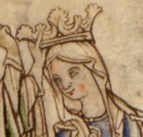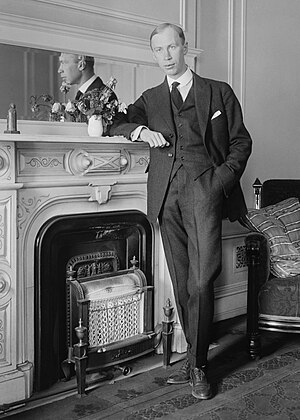From today's featured article

Dish-bearers and butlers were thegns who acted as personal attendants of kings in Anglo-Saxon England. Royal feasts played an important role in consolidating community and hierarchy among the elite, and dish-bearers and butlers served the food and drinks at these meals. Thegns were substantial landowners who occupied the third lay (non-religious) rank of the aristocracy in English society, after the king and ealdormen. Dish-bearers and butlers ranked above ordinary thegns in lists of witnesses to charters, and they probably also carried out diverse military and administrative duties as required by the king. No dish-bearer or butler is known to have served in the reigns of two different kings, suggesting that the position was a personal one which ended with the king's death. Some went on to have illustrious careers as ealdormen, but most never rose higher than thegn. In the later Anglo-Saxon period, queens (example depicted) and æthelings (sons of kings) also had dish-bearers. (Full article...)
Did you know ...
- ... that a year when the Feast of Saint James falls on a Sunday is designated a Jacobean Holy Year, and the Holy Door (pictured) at the Cathedral of Santiago de Compostela is unblocked for all to enter?
- ... that the coat of arms of Santiago de Compostela features a chalice and host from the Galician arms, as well as a star and the tomb of Saint James?
- ... that the lower level of Santiago de Compostela's Plaza de la Quintana is called the Quintana de Mortos because it was once a cemetery?
- ... that during a Jacobean Holy Year, the Berenguela Tower's lantern is lit throughout the year to act as a lighthouse to guide pilgrims to the cathedral?
- ... that according to legend the tomb of James the Apostle was forgotten for eight centuries until it was found by Pelagius in the forest Libredón?
- ... that both the Way of the Lighthouses and the Way of Saint James end at Cape Finisterre in Galicia?
- ... that the Cross of Saint James is associated with the apostle's appearance at the mythical Battle of Clavijo?
- ... that Queen Lupa sent the disciples of James the Apostle to Mount Ilicino without telling them about a dragon?
In the news
- American singer Tony Bennett (pictured) dies at the age of 96.
- Flooding and landslides in South Korea leave at least 40 people dead and 6 others missing.
- In the United States, actors in the SAG-AFTRA trade union go on strike, joining writers in the Writers Guild of America strike.
- Flooding and landslides in northern India leave at least 100 people dead.
On this day
July 25: National Day of Galicia
- 1547 – Henry II was crowned King of France at Reims Cathedral.
- 1591 – Eighty Years' War: Dutch and English forces relieved the siege of Knodsenburg in the Spanish Netherlands, having defeated the Duke of Parma's army in the field.
- 1893 – The Corinth Canal was formally opened, bisecting the narrow Isthmus of Corinth in Greece to connect the Ionian Sea's Gulf of Corinth with the Aegean Sea's Saronic Gulf.
- 1950 – Korean War: After American troops withdrew, North Korean forces captured the village of Yongdong in South Korea.
- 2007 – Pratibha Patil (pictured) was sworn in as the first female president of India.
- Sibylla, Queen of Jerusalem (d. 1190)
- James Barry (d. 1865)
- Guillermo Mota (b. 1973)
- Azimzhan Askarov (d. 2020)
Today's featured picture

|
Sergei Prokofiev (1891–1953) was a Russian composer, pianist, and conductor. As the creator of works across numerous music genres, he is regarded as one of the major composers of the 20th century. His works include operas such as The Gambler, The Fiery Angel and The Love for Three Oranges; the suite Lieutenant Kijé; the ballet Romeo and Juliet and Peter and the Wolf. Altogether during his adult life, he composed seven operas, seven symphonies, eight ballets, five piano concertos, two violin concertos, a cello concerto, a symphony-concerto for cello and orchestra, and nine completed piano sonatas. Photograph credit: Bain News Service; restored by MyCatIsAChonk
Recently featured:
|
Other areas of Wikipedia
- Community portal – The central hub for editors, with resources, links, tasks, and announcements.
- Village pump – Forum for discussions about Wikipedia itself, including policies and technical issues.
- Site news – Sources of news about Wikipedia and the broader Wikimedia movement.
- Teahouse – Ask basic questions about using or editing Wikipedia.
- Help desk – Ask questions about using or editing Wikipedia.
- Reference desk – Ask research questions about encyclopedic topics.
- Content portals – A unique way to navigate the encyclopedia.
Wikipedia's sister projects
Wikipedia is written by volunteer editors and hosted by the Wikimedia Foundation, a non-profit organization that also hosts a range of other volunteer projects:
-
Commons
Free media repository -
MediaWiki
Wiki software development -
Meta-Wiki
Wikimedia project coordination -
Wikibooks
Free textbooks and manuals -
Wikidata
Free knowledge base -
Wikinews
Free-content news -
Wikiquote
Collection of quotations -
Wikisource
Free-content library -
Wikispecies
Directory of species -
Wikiversity
Free learning tools -
Wikivoyage
Free travel guide -
Wiktionary
Dictionary and thesaurus
Wikipedia languages
This Wikipedia is written in English. Many other Wikipedias are available; some of the largest are listed below.
-
1,000,000+ articles
-
250,000+ articles
-
50,000+ articles


